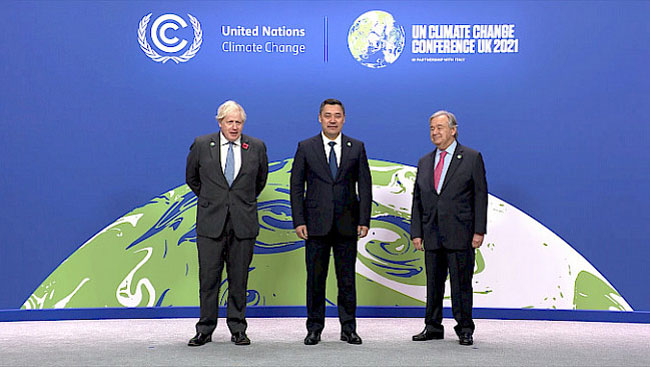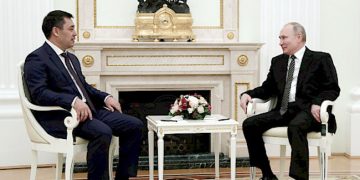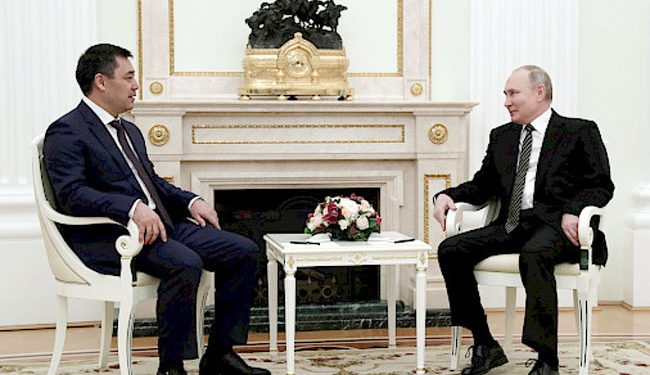One of the priority directions of Kyrgyzstan is an international dialogue. Kyrgyzstan is a member of various international organizations that cover a wide range of interests. To strengthen these ties, the country’s president made many international trips and visits this year.
Sadyr Zhaparov, who was elected the president of Kyrgyzstan at elections in Jan. 11, 2021 made his first official visit as president to Russia and met with Vladimir Putin on Feb. 24.
During the meeting, the two presidents discussed the potential of bilateral relations. The Kyrgyz president noted the vector of development and stated that Kyrgyzstan intends to further deepen Eurasian integration within the EAEU, CIS, CSTO and SCO and this is the priority of the country’s foreign policy. Vladimir Putin, in turn, announced his readiness for further cooperation.
“We will be glad to work with you in all these areas. I would like to say again that we are hoping the measures you plan to take inside the country, including amendments to the Fundamental Law of Kyrgyzstan, will facilitate stabilization in the republic and will certainly promote our bilateral interstate ties,” the Russian president said.
In addition, during this visit, Zhaparov met with Kyrgyzstanis living in Russia. During the meeting, the president noted that his goal is to create all the necessary conditions for the return of compatriots to their homeland.
“My goal is to solve the existing problems of our people, provide jobs and a decent life for all citizens of Kyrgyzstan, as well as create favorable conditions for the return of compatriots working abroad to their homeland,” Zhaparov said.
In early March, Sadyr Zhaparov paid a visit to Kazakhstan. As part of the state visit, the Kyrgyz president held bilateral talks with President of Kazakhstan Kassym-Jomart Tokayev and discussed topical issues of bilateral and multilateral cooperation, as well as further prospects for interaction.
On April 26, the president took part in the 77th session of UNESCAP. In his speech, he stressed the importance of strengthening economic cooperation and to take into account the factor of the pandemic. He noted that it is important not only to return to the pre-pandemic track, but also to do better than it was.
“There is a very important task to work out solutions to strengthen economic cooperation in the region during a pandemic on the principle – better than it was. In the context of the pandemic, we need not to create obstacles and new barriers, but to cooperate as much as possible in order to develop trade and improve the living standards of the population,” Zhaparov said.
On May 24, Sadyr Zhaparov met with Vladimir Putin in Sochi. During the meeting, the sides touched upon the current state and promising areas of Kyrgyz-Russian bilateral cooperation, the implementation of the agreements reached following the results of the last meeting, as well as priority plans for interaction within the framework of integration associations.
On June 9, Zhaparov left for Turkey for a working visit. During the visit, Sadyr Zhaparov held bilateral talks with President of Turkey Recep Tayyip Erdogan. The heads of the two states discussed bilateral and multilateral cooperation, as well as topical issues of interaction within the framework of the Cooperation Council of Turkic Speaking States (CCTS). In addition, Sadyr Zhaparov took part in the 5th meeting of the Supreme Council for Strategic Cooperation between Kyrgyzstan and Turkey.
On June 27-28, Sadyr Zhaparov paid an official visit to Turkmenistan. The president inspected the exhibition of export goods of Turkmenistan and took part in the opening ceremony of the Kyrgyz-Turkmen Economic Forum.
President Sadyr Zhaparov also met with President of Turkmenistan Gurbanguly Berdimuhamedov.
Following the talks, the heads of states signed a joint statement. In addition, members of the official delegations of the two countries signed a number of documents aimed at building up Kyrgyz-Turkmen cooperation in trade, economic, cultural, humanitarian, educational and other spheres.
On June 28, Sadyr Zhapaov arrived in the capital of Tajikistan for an official visit. As part of his official visit, President Sadyr Zhaparov held talks with President of Tajikistan Emomali Rahmon. Following the talks, the two presidents adopted a joint statement. In addition, members of the official delegations of the two countries signed a number of documents aimed at building up Kyrgyz-Tajik cooperation in various fields.
In mid-September, the CSTO Summit was held in Dushanbe. During his speech Sadyr Zhaparov raised the issue of the Kyrgyz-Tajik border.
“The Kyrgyz Republic, being a peace-loving, open and democratic state, from the first days of independence has pursued and is pursuing a consistent, friendly, good-neighborly and balanced policy in relation to neighboring countries and, in general, to all states of the world. The position of Kyrgyzstan on the need to resolve controversial issues between the countries is exclusively by peaceful means and politico-diplomatic methods at the negotiating table remains unchanged,” Sadyr Zhaparov stressed.
Climate preservation has become an important topic this year. Sadyr Zhaparov has spoken about this more than once. On Nov. 2, the president delivered a message at the World Leaders Summit of the 26th Conference of the Parties to the United Nations Framework Convention on Climate Change in Glasgow.
“The problems I have outlined related to the negative impact of climate change are in many respects characteristic of many mountainous countries. To solve them, governments, including Kyrgyzstan, will need external assistance. In this regard, we propose to envisage in the decisions of Glasgow separate targeted financing for the developing mountainous countries in need.
In particular, we propose to create a special fund under the auspices of the UN for the implementation of targeted programs for adaptation to climate change with an emphasis on preserving glaciers, forests and biodiversity, increasing preparedness for natural disasters, and providing socio-economic support to mountain communities, especially women and children,” Zhaparov noted.
- Latest
- Trending





